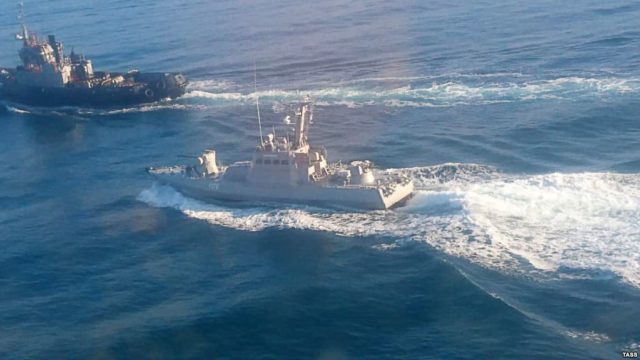
Azov Sea, Kerch Strait: Evolution of Their Purported Legal Status (Part One)
Publication: Eurasia Daily Monitor Volume: 15 Issue: 169
By:

Russia has perpetrated acts of war against Ukraine in the Kerch Strait and the adjacent portion of the Black Sea on November 25 (see EDM, November 26, 28, 29). Moreover, during the preceding months, Russia had systematically and aggressively obstructed Ukrainian and international shipping in the Sea of Azov (see EDM, February 22, April 12, May 22, 31, June 11, 28, November 6).
Western and Ukrainian responses to these events have often revealed confusion about the legal status of the Azov Sea and Kerch Strait. Misunderstandings include: referencing the international law of the sea in connection with the Azov Sea and Kerch Strait, terming the Kerch Strait an international waterway, or proposing Western naval expeditions into the Azov Sea.
For its part, Russia has countered with arbitrary interpretations of the Azov Sea’s and Kerch Strait’s legal statuses—interpretations that Russia alone is presently able to impose through force in the theater. Western and Ukrainian confusion as well as Russian rejoinders stem from legal and pseudo-legal complexities injected by Russia into what passes for the legal status of the Azov Sea and Kerch Strait.
Whether a legal status of these two bodies of water exists, is questionable. To the extent to which it exists, it is murky. Moscow has shaped it this way because Russian policies thrive on exploiting legal vacuums covered by Russian-composed legal formulae, whereby Russia de facto holds sway.
The purported legal status of these two bodies of water is codified in the “Treaty on Cooperation Between the Russian Federation and Ukraine on the Use of the Azov Sea and Kerch Strait,” signed in December 2003 and ratified by both parliaments in April 2004 (text in Diplomaticheskii Vestnik, no. 1, 2004).
The content of this treaty forms Russia’s legal basis for its recent use of force in the Azov Sea and Kerch Strait. However, Russia has been itself in breach of this and other treaties by seizing Crimea in 2014, a move that has unilaterally overturned the hitherto agreed-upon basis for the interpretation and application of the 2003 treaty.
Under the terms of the 2003 treaty, the legal status of the Azov Sea and Kerch Strait is (or purports to be) a purely bilateral arrangement between Russia and Ukraine. Strict bilateralism is meant to preclude (or purports to preclude) Ukraine’s recourse to international law to protect its safety and economic interests in these bodies of water and Ukrainian coastal areas.
This treaty defines the Azov Sea and Kerch Strait as “historically internal waters of the Russian Federation and Ukraine” (the qualifier “historically internal” is meant to emphasize that they never had an international status in the past). The “Sea of Azov shall be delimited along the line of the state border by agreement between the two sides.” Similarly, “issues related to the waters of the Kerch Strait shall be settled by agreement between the sides.” There is no reference to national sectors in connection with the border in the Azov Sea, and no mention of a border in the Kerch Strait (Art. 1).
Commercial ships and warships under either the Russian flag or the Ukrainian flag shall enjoy freedom of movement in the Azov Sea and Kerch Strait. Commercial ships under third countries’ flags, headed for Russian or Ukrainian ports or returning from them, however, “may [sic] access the Azov Sea and pass through the Kerch Strait.” Whereas “warships and other non-commercial ships” belonging to third states, headed for Russian or Ukrainian ports, “may access the Azov Sea and pass through Kerch Strait by invitation or permission from one of the Sides [Russia or Ukraine] agreed upon with the other Side.” This provides a basis for a Russian veto on any Ukrainian invitation or permission (Art. 2).
Russia and Ukraine shall regulate all questions related to shipping, navigation, search-and-rescue, fishing, ecology and other matters in the Azov Sea and Kerch Strait either on the basis of existing agreements or by concluding new ones—a potentially open-ended situation of “ex lex” or legal void here (Art. 3).
Any disputes over this treaty’s interpretation and application shall be resolved bilaterally, “as well as through other peaceful means chosen by the Sides”—again, a basis for a Russian veto on non-bilateral solutions (Art. 4).
The treaty’s preamble (which is non-binding) contains a double reference to the 1997 bilateral inter-state treaty (whereby Russia had legally recognized Ukraine’s territorial integrity and existing borders) and the treaty on the border between Russia and Ukraine (signed in January 2003, and not covering the Azov Sea). The preamble to the treaty on the Azov Sea and Kerch Strait commits Russia and Ukraine to resolve any issues by peaceful means only, “jointly or by agreement” (i.e. on a bilateral basis only).
This treaty is equally revelatory through its omissions. The Russian side undoubtedly pre-programmed those omissions, and the Ukrainian side (under then-president Leonid Kuchma) caved in when signing the treaty in December 2003.
Those omissions are glaring. The treaty makes no reference to general international law, nor to the United Nations Convention on the Law of the Sea (UNCLOS). The Russian-Ukrainian treaty does not mention any national maritime sectors or exclusive economic zones. Nor does it provide for any third-party arbitration of disputes, other than purely bilateral settlement. The treaty carries no time-frame of its validity, no expiry date, and no procedure for treaty termination. It is, in Russia’s intention, a treaty that should bind Ukraine in perpetuity to arrangements inherently favoring Russia and which Russia can further interpret at will through the threat or actual use of force, as demonstrated recently.
Facing this situation, the Ukrainian government and public circles are now debating whether they can unilaterally denounce the 2003 bilateral treaty with Russia and embrace international maritime law instead.



